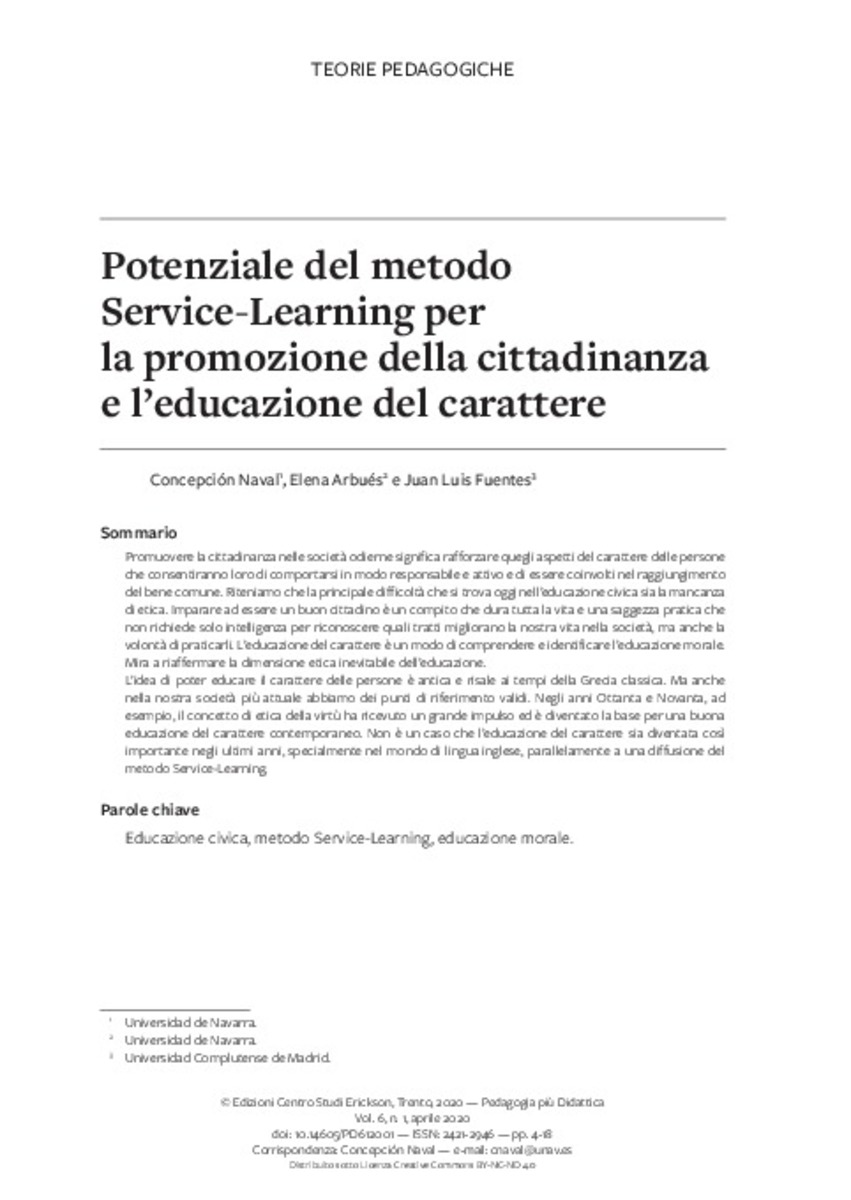Full metadata record
| DC Field | Value | Language |
|---|---|---|
| dc.creator | Naval, C. (Concepción) | - |
| dc.creator | Arbués, E. (Elena) | - |
| dc.creator | Fuentes-Gómez-Calcerrada, J.L. (Juan Luis) | - |
| dc.date.accessioned | 2020-09-22T10:51:04Z | - |
| dc.date.available | 2020-09-22T10:51:04Z | - |
| dc.date.issued | 2020 | - |
| dc.identifier.citation | Naval, C. (Concepción) | es |
| dc.identifier.issn | 2421-2946 | - |
| dc.identifier.uri | https://hdl.handle.net/10171/59450 | - |
| dc.description.abstract | Promuovere la cittadinanza nelle società odierne significa rafforzare quegli aspetti del carattere delle persone che consentiranno loro di comportarsi in modo responsabile e attivo e di essere coinvolti nel raggiungimento del bene comune. Riteniamo che la principale difficoltà che si trova oggi nell’educazione civica sia la mancanza di etica. Imparare ad essere un buon cittadino è un compito che dura tutta la vita e una saggezza pratica che non richiede solo intelligenza per riconoscere quali tratti migliorano la nostra vita nella società, ma anche la volontà di praticarli. L’educazione del carattere è un modo di comprendere e identificare l’educazione morale. Mira a riaffermare la dimensione etica inevitabile dell’educazione. L’idea di poter educare il carattere delle persone è antica e risale ai tempi della Grecia classica. Ma anche nella nostra società più attuale abbiamo dei punti di riferimento validi. Negli anni Ottanta e Novanta, ad esempio, il concetto di etica della virtù ha ricevuto un grande impulso ed è diventato la base per una buona educazione del carattere contemporaneo. Non è un caso che l’educazione del carattere sia diventata così importante negli ultimi anni, specialmente nel mondo di lingua inglese, parallelamente a una diffusione del metodo Service-Learning. | es_ES |
| dc.description.abstract | Promoting citizenship in present-day societies means reinforcing those aspects of people’s characters which will allow them to behave responsibly and actively and be involved in achieving the common good. We believe that the main difficulty to be found in civic education nowadays is a lack of ethics. Learning to be a good citizen is a lifelong task and practical wisdom which not only demands intelligence to recognize which traits improve our life in society but also the will to practice them. Character education is a way of understanding and identifying moral education. It aims to reaffirm the inescapable ethical dimension of education. This proposal has its origins in classical Greece, but it was not until the 1980s and 90s that the ethics of virtue received a great boost and became the basis for a good deal of contemporary character education. It is not by chance that character education has grown so much in importance over the last few years, especially in the English-speaking world, in parallel with an increase in Service-Learning methodology. | es_ES |
| dc.language.iso | ita | es_ES |
| dc.publisher | Edizioni Centro Studi Erickson | es_ES |
| dc.rights | info:eu-repo/semantics/openAccess | es_ES |
| dc.subject | Educazione civica | es_ES |
| dc.subject | Metodo Service-Learning | es_ES |
| dc.subject | Educazione morale | es_ES |
| dc.subject | Citizenship education | es_ES |
| dc.subject | Character education | es_ES |
| dc.subject | Service-learning | es_ES |
| dc.title | Potenziale del metodo Service-Learning per la promozione della cittadinanza e l’educazione del carattere | es_ES |
| dc.title.alternative | Service-Learning potential in citizenship and character education | es_ES |
| dc.type | info:eu-repo/semantics/article | es_ES |
| dc.description.note | CC BY NC ND | es_ES |
| dc.identifier.doi | 10.14605/PD612001 | - |
| dadun.citation.endingPage | 18 | es_ES |
| dadun.citation.number | 1 | es_ES |
| dadun.citation.publicationName | Pedagogia più Didattica | es_ES |
| dadun.citation.startingPage | 4 | es_ES |
| dadun.citation.volume | 6 | es_ES |
Files in This Item:
Statistics and impact
Items in Dadun are protected by copyright, with all rights reserved, unless otherwise indicated.






